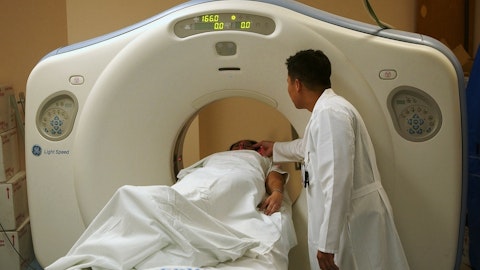Rishi Parekh: How you doing? Thanks for taking my questions. One, going back on the NSA, I think you said that you’re winning 80% of your cases I believe, or I assume you’re winning at a rate that is above the QPA. So a couple of things. One, can you confirm that you are winning above the rate €“ above the QPA rate and what that multiple looks like? And then two, can you just give us an idea as to how many claims you’re running through arbitration and what the DSOs are on these claims?
Jim Swift: Yes, it’s Jim. Listen, we’re actually winning those well above the QPA. And we see that as a barometer in terms of our ability to contract back in network at relatively good rates. And the process €“ as everybody has heard, the process has been a bit disjointed. We, however, feel that we’ve had a great team and that our same vendor has been one of those people on that team. So the process of submitting the claims into the IDR has gone very smoothly for us.
Rishi Parekh: On that, has the R1 situation in any way affected your ability to collect on those claims?
Jim Swift: No, not at all. Actually that’s been a bright spot in the relationship.
Rishi Parekh: And then the TMA summary judgment with regards to the QPA, just curious as to how you guys think it will affect you?
Jim Swift: Well, I think, we all can look at the effect that they’re shutting down, the claims going in after February 6. We look for resolution to that issue and hopeful that there’ll be a more judicious view of what should be considered in the IDR process and not just the QPA. So we remain vigilant and we remain very positive that there’ll be an outcome there. But none of us can know HHS and CMS, what they’re going to do with that. So we’re waiting to hear following that court case.
Marc Richards: Right now claims can go into the IDR process, but they can’t come out. So it’s going to increase the backlog, which is very unfortunate. Fortunately for us, because we’re overwhelmingly in network, it doesn’t affect us the way it does many other people. But we certainly hope that the government clarifies the rules so the IDR process can restart. So this is the second time that the courts have said that the rulings have been inappropriate and don’t mirror the bipartisan legislation. But now there’s this stall, which is unfortunate. Again, fortunately for Pediatrix, we are overwhelmingly in network and we win. We have won overwhelmingly in the cases that have gone to arbitration. So I think it’s a €“ it is again a signal that if you look at all the factors that were in the bipartisan legislation, it favors a group like ours.
Rishi Parekh: And just the last question on the NSA, as it relates to the percentage that is out of network, can you just remind me of as to what that percentage is? And then I think you had stated earlier that you think that there’s a high probability that you could move some of that into an in network agreement, and I was hoping that maybe you could quantify of that amount that is out of network. Where do you think there’s a high probability or what is the amount that could actually move in network over the course of 2023?
Jim Swift: Yes. I think roughly we have about 5% where we’re out of network. And that’s kind of held traditionally along those lines over the last number of years. Obviously, anybody had the concern that with the NSA that and payer behavior that could get worse. To Marc’s point, where we are out of network, we feel very, very good about what we’re able to do with that. And again, we may be in a good position to be back in network.
Rishi Parekh: And just the last question though for 2023, can you just walk us through your capital allocation policies? Thank you.





